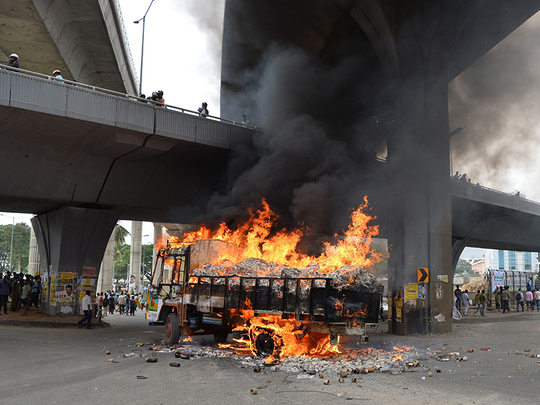
New Delhi: Riots over water sharing have been repeatedly shattering peace and public life in several Indian states over the years. The reason being, after Independence, demand for water has been increasing at an accelerated rate due to rapid growth of population, agricultural development, urbanisation and industrialisation. These developments have led to interstate disputes about the sharing of water of almost all major rivers.
Tensions have led to demonstrations and risen to the point of violence. The battle between Karnataka and Tamil Nadu over the Cauvery river water is a recent example.
Environmentalist Bhanu Pratap Singh explained, “About 80 per cent of Karnataka is drought prone, followed by Tamil Nadu at 65 per cent. Karnataka is the second-most arid state after Rajasthan. The principal reason for water disputes in distribution arises during inadequate rainfall years. It cropped up this year when the monsoon failed. Every time the monsoon fails, farmers stop planting and brace up for agitation.
“Water issues have blown up because of overuse, the drying up of water resources, including groundwater in several regions due to excessive exploitation and contamination and the growth of water-intensive crops (including sugar cane) over the decades.”
Moreover, since the country comprises interstate rivers and their waters are shared by two or more states, these are plagued with disagreements. Some of the rivers are not perennial and with the monsoon failing more often, the flow in the rivers has dwindled over the years even as the drinking water demands keep rising alarmingly. In such scenarios, sharing water has become increasingly contentious.
Singh cites other reasons as well. “Water overuse and wastage are the result of it being underpriced. While it is crucial that states get their rightful share, it is equally important that water pricing be done according to its availability in the monsoon and drought years. Since water is becoming increasingly scarce, this can at least plug the problem relating to overuse. There is also a need to think on ideas such as recycling, desalination and interlinking rivers, making them a national resource.”
Expert’s advice
Social activist Rajendra Singh, who won the 2001 Ramon Magsaysay Award for his pioneering work in community-based efforts in water management and water harvesting, says, “It’s time we resolved river water sharing issues in the country, else it will snowball into a civil war for water. The world over, experts are emphasising the need to save water, which is the responsibility of each and every individual on earth. We need to realise that it is a crime to waste rainwater. Conservation and disciplined use of water are the only way to survival. Water issues have risen because society considers it the government’s responsibility, as the latter collects taxes. But, unless people treat water as their responsibility too and stop its misuse, the battle over water will be the biggest all around.”












